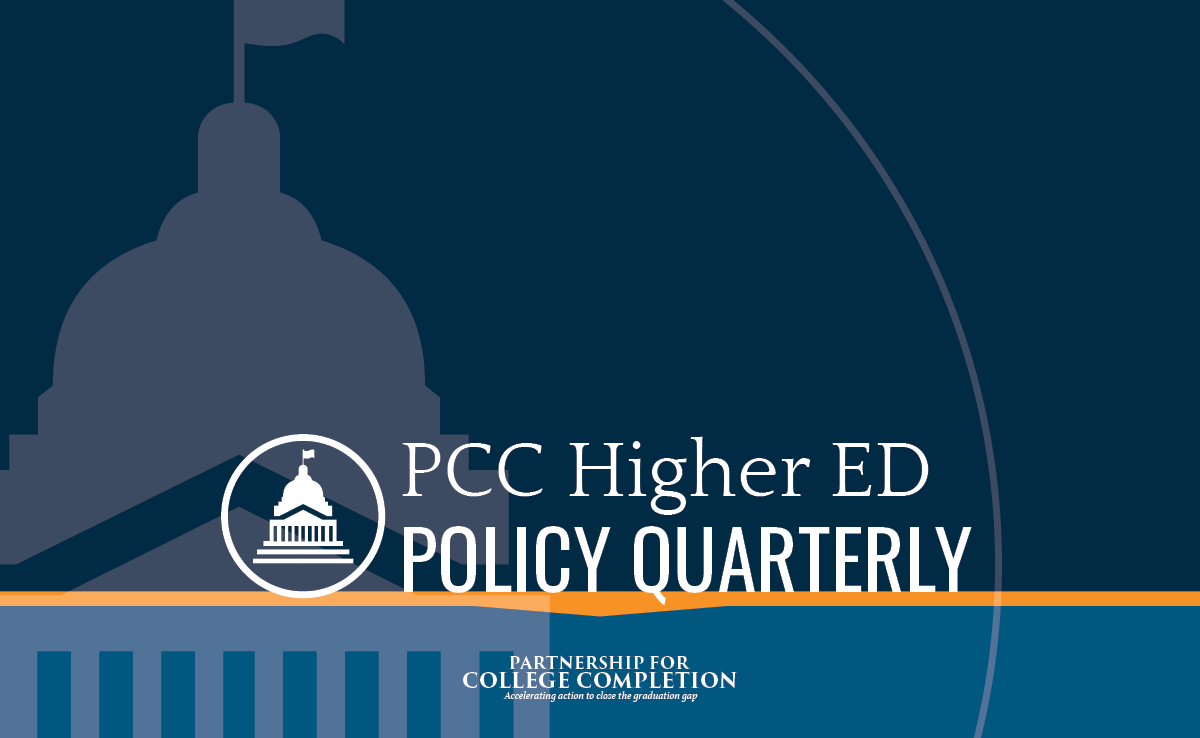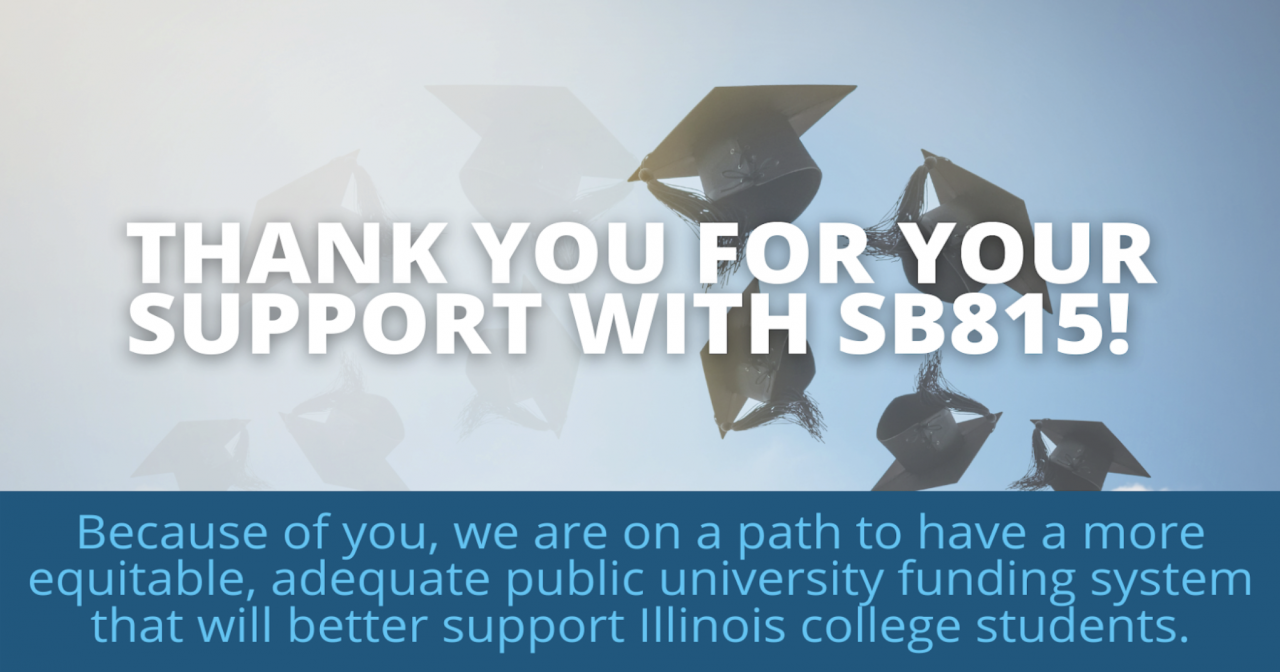
Letter from the Executive Director
Taken together, SB 815 and HB 3438 mark important steps towards facing and changing the things that need to be changed in our state’s public colleges and universities. There is still much more work ahead, especially with regards to increasing the overall appropriations to our state’s higher education system, but we are heartened by the steps that our legislature is taking to reverse the decades-long, downward trajectory of higher education in Illinois. Read More.
—
Snapshot of Federal Higher Education Policy
Biden Administration Makes Undocumented Students Eligible for Emergency Aid
President Biden reversed a Trump administration rule that barred undocumented students from eligibility for federal emergency grant aid that has come as part of the previous two stimulus packages. On May 11, Education Secretary Miguel Cardona announced that the emergency grant funding from the American Rescue Plan would be available to undocumented, DACA, and international students, with students with greater need still prioritized.
American Families Plan Gives Hope for Higher Ed Resources, but Faces Opposition
The Biden administration announced the $1.8 trillion American Families Plan, and a significant part of this investment would go toward funding higher ed. The plan would provide $109 billion for two years of free community college, $85 billion increased investment in Pell grants, and $46 billion for HBCUs, TCUs, and MSIs. It also would give $62 billion for evidence-based strategies to increase retention and completion at community colleges, which could fund work underway at Illinois colleges, like implementation of the Developmental Education Reform Act (DERA). However, these programs are largely planned through matching grants, and some Republican-led states have already started framing this as federal government overreach.
—
Snapshot of Illinois Higher Education Policy
Spring 2021 Session Recap
The 102nd first regular session wrapped up on May 31 with lawmakers passing significant legislation on affordable housing and ethics reform, creating new district maps, and passing a comprehensive state budget. Hundreds of bills related to higher education were introduced in the Illinois General Assembly this spring, addressing issues ranging from student borrower protections to system consolidation. Here we highlight a few higher education bills supported by the Partnership for College Completion (PCC) and heading to the Governor’s Office for signature:
- SB815 (Sen. Lightford/Rep. Ammons) – creates a Commission on Equitable Public University Funding to research, model, and ultimately recommend specific criteria and approaches for an equity-based funding model for public universities. The Commission will begin work no later than October 15, 2021 and deliver its recommendations by July 1, 2023. See our full statement here. PCC will be sharing resources and updates on this historic effort in the year ahead – stay tuned!
- SB190 (Sen. Glowiak Hilton/Rep.West) – requires colleges and universities to designate at least one employee to serve as a liaison for housing insecure students to assist students in accessing related resources and services. Each college and university must also develop a plan to provide access to on-campus housing between academic breaks to homeless students enrolled at its institution.
- SB267 (Sen. Villanueva/Rep. Guzzardi) – requires institutions to collect data on student parents in Illinois so that the state has a better understanding of the needs of students who are parents and to help colleges and universities recruit, retain, and graduate this significant student population.
- HB226 (Rep. Greenwood/Sen. Belt) – requires all public colleges and universities to implement a test-optional admissions policy for Illinois students, eliminating requirements that prospective Illinois students submit a standardized test score for admissions consideration. The push for test-optional admissions is built on research that shows that compared to measures like GPA, test scores track more closely with income and race than a student’s college readiness. We know test-optional policies alone will not eliminate the disparities in access to higher education but HB226 is a necessary first step.
- HB3438 (Rep. Hirschauer/Sen. Villa) beginning in the 2022-23 academic year, this bill requires universities and community colleges to designate an employee as an Undocumented Student Resource Liaison to be available on campus to provide assistance to undocumented students and mixed status students within the United States in streamlining access to financial aid and academic support to successfully matriculate to degree completion.
Congratulations to all the advocates and elected officials who dedicated themselves to these legislative measures. PCC will be tracking these bills as they head to the Governor’s Office and begin implementation and will continue to share opportunities for action.
Budget
In the early morning hours of June 1, the General Assembly passed a $42 billion state budget based on tax revenue sources and $2.5 billion in spending from federal relief funds. Like many sectors, spending on higher education remained relatively flat, including flat-funding for institutions and programs like the AIM HIGH grant program. The legislature did increase funding for some programs, adding $28 million to the Monetary Award Program, providing funding for university participation in the common application, and $250,000 for implementation of the Illinois Board of Higher Education’s strategic plan.
While PCC advocated for a $50 million increase in MAP, funding for implementation of the Mental Health Early Action on Campus Act, and increased funding for the Minority Teachers Initiative which were not realized this year, we appreciate the difficult decisions legislators faced in delivering this year’s budget and applaud the General Assembly for continuing to invest in higher education. PCC will continue to work with the Governor’s Office and Illinois’ elected officials to ensure higher education and critical programs like MAP are prioritized in the years ahead.
—
States Policy We’re Watching
University of California System Will Not Consider Tests in Admissions or Scholarships
The University of California Board of Regents voted to eliminate the use of SAT and ACT, not only in admissions, but also in allocating scholarships to students. The policy will be phased in over the next five years, and contrary to a plan that the Board of Regents approved last May, it will be test-blind, meaning that students will not submit test scores. Test-optional and test-blind policies have potential to increase equity in admissions, but are not a panacea; rather, they should be coupled with thoughtful evaluation of institutions’ admissions practices and external accountability measures.
Hundreds of Thousands of Students Apply to Michigan’s Stimulus-Funded Free College Programs
The State of Michigan has launched Future Frontliners and Michigan Reconnect, two free college programs utilizing COVID-19 stimulus package funding, and has seen applications that have surpassed its expectations for either.
—
Get to Know Illinois’ Leaders—An Interview with State Rep. Katie Stuart
Representative Katie Stuart of Edwardsville, a former elementary and high school math teacher and Southern Illinois University math instructor, was appointed this year to the role of chair of the House Higher Education Committee, taking over for Leader Carol Ammons. Some of Representative Stuart’s higher education priorities have included securing protections for student borrowers, working toward fair funding and affordability for Illinois universities, and increasing opportunities for students and resources for university employees.
In this second quarterly newsletter, Representative Stuart reflects on the recent legislative session and shares her hopes and goals for higher education in the years ahead. Read the full interview here.
—
Illinois Equity in Attainment (ILEA) Happenings
Students’ Perspectives, the Pandemic and the College Experience
Several students from PCC’s Student Advisory Council penned blogs that offer a glimpse into how the COVID-19 pandemic has affected their college experience. These students, representing community colleges and public universities across Chicago, share insights about adjusting to remote learning for the first time as well as integrating part-time employment on top of other non-academic concerns. Visit the Illinois Colleges Forward website to read their blogs.
—
Upcoming Events
- IHEN Legislative Session Debrief – June 22, 2021
Join us on Tuesday, June 22 from 12PM – 1PM to learn more about the higher education related policies that moved this legislative session, critical higher education budget items, and learn what actions steps are next. Guest speakers have been invited and a formal agenda will be provided to all who register. RSVP here. - To&Through Data Collaborative: Dr. Jane Stout – June 22, 2021
- 2021 College Changes Everything Conference – Week of July 12, 2021
—
? Take Action 1-2-3 ?
READ & SHARE.
Diverse Stakeholders Across Illinois Outline Key Steps to Address 29% Drop in Black Student Enrollment in Higher Education
The Equity Working Group, a statewide, cross-sector partnership convened by Chicago State University, has identified critical actions needed to close equity gaps and enable Black students, families, and communities to thrive and survive in Illinois. These actions are detailed in the Equity Working Group for Black Student Access and Success in Illinois Action Plan.
Read the Action Plan at: http://bit.ly/ILEquityWkGroup
A Special Thank You Regarding SB815
On behalf of the Illinois Higher Education Network (IHEN), we want to thank Leader Lightford, Leader Ammons, and all of the advocates and supporters of SB815. It was your support, testimonies, and witness filings that made the passage of this legislation possible. Because of your advocacy we are on our way to developing an equitable funding model for Illinois’ public universities and a more equitable higher education system for Illinois students.


